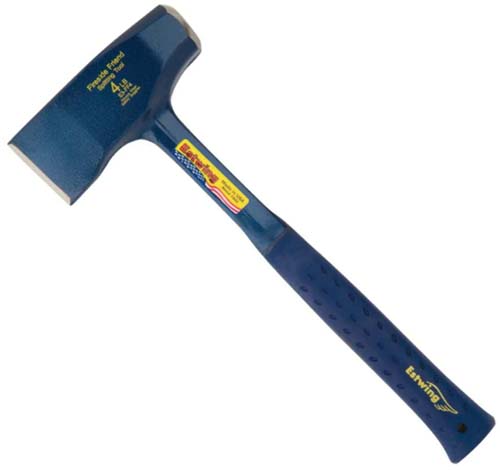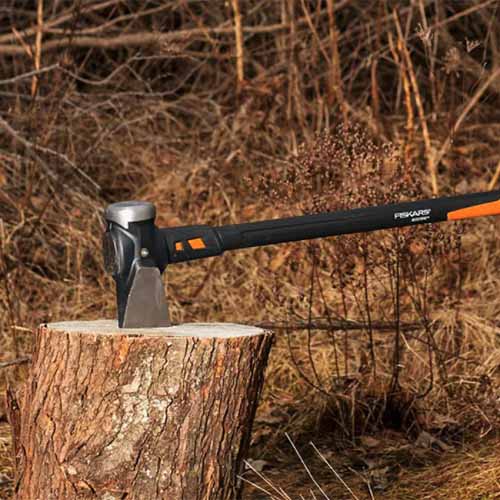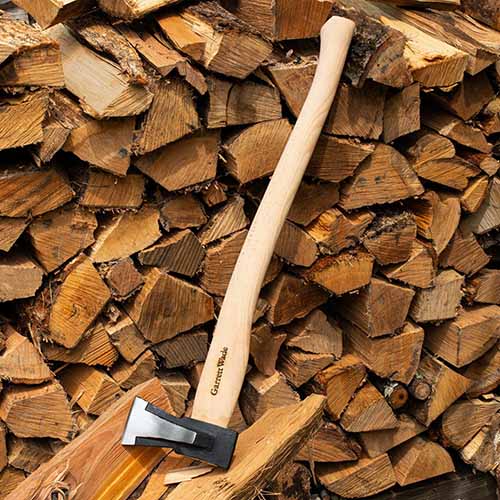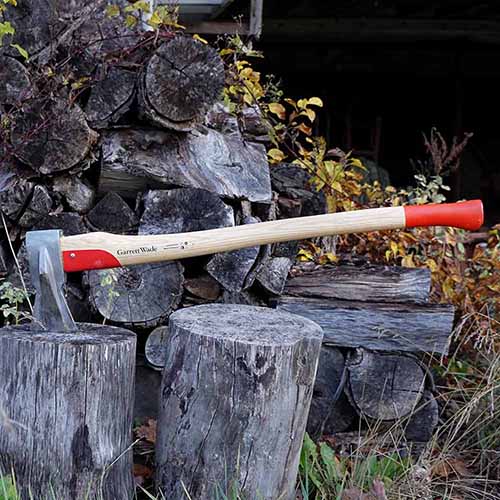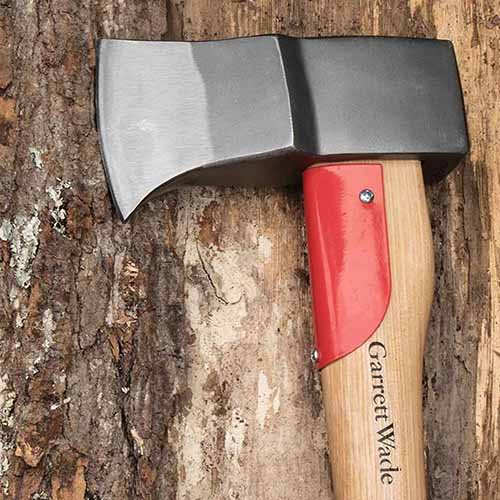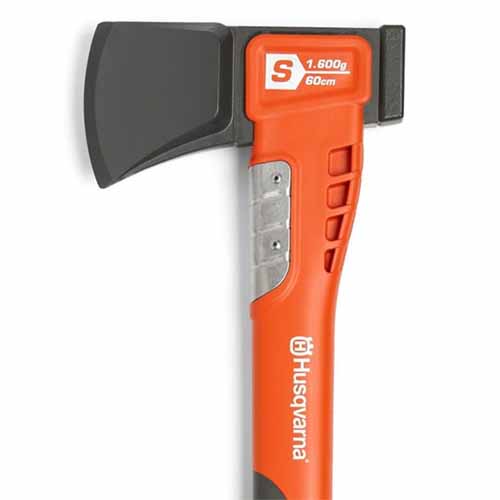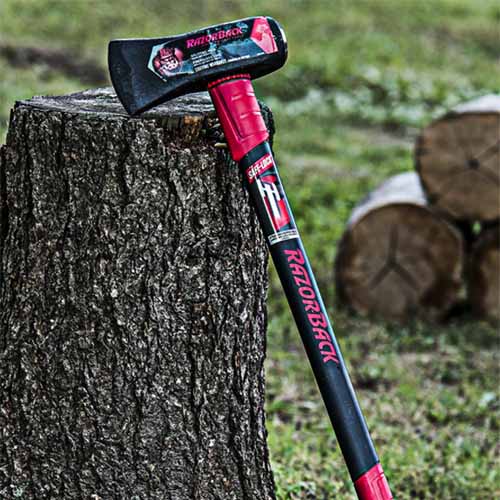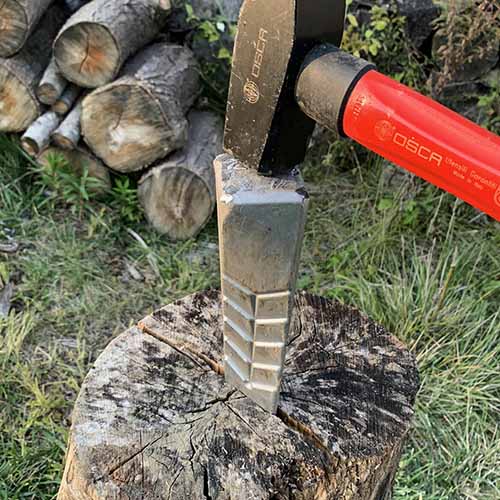The Right Tool for Chopping Firewood: 11 Top-Ranked Mauls and Splitting Axes


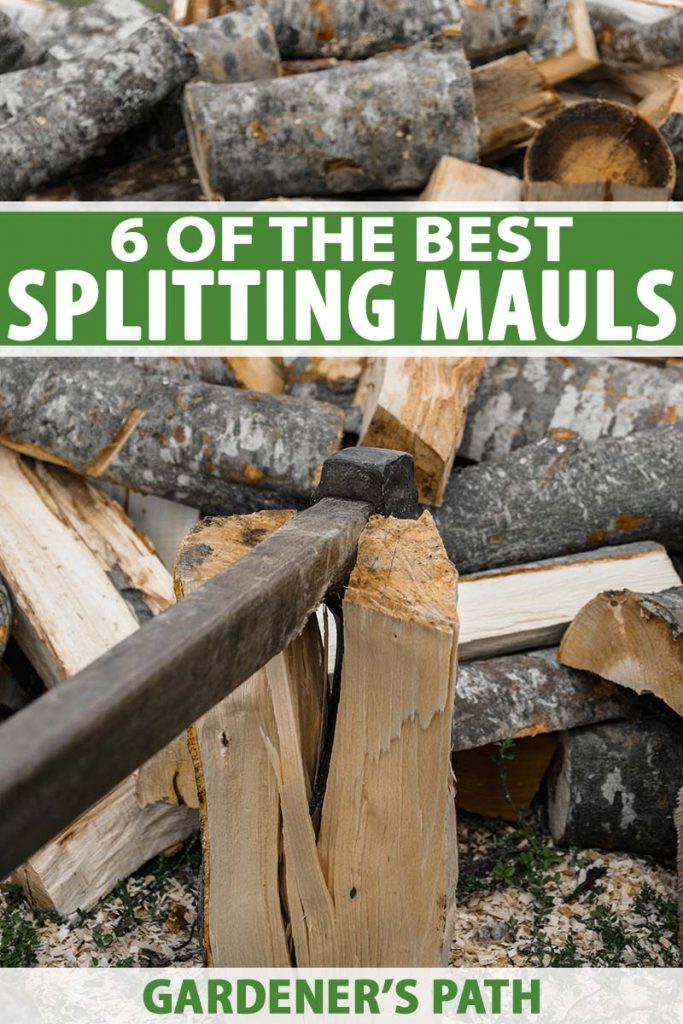

Okay, it’s true – splitting wood isn’t the most “girly” of activities.
But I love it. When the garden’s tucked away for the winter, it’s a great reason to step outside into the crisp, cool air and get a bit of exercise.
A highly productive task, large rounds or billets of wood are neatly transformed into halves, quarters, and kindling, ready for the fireplace or woodstove.
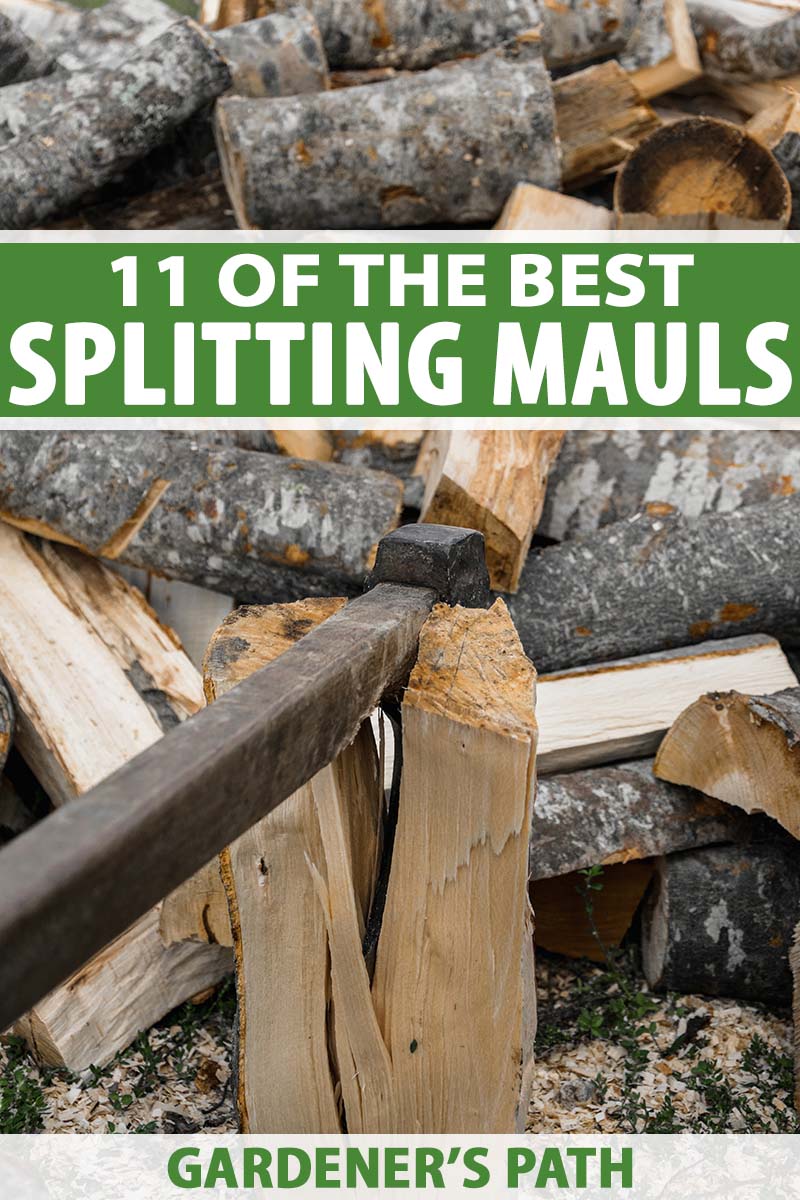

We link to vendors to help you find relevant products. If you buy from one of our links, we may earn a commission.
And there’s no denying the charm and cozy appeal of stacked firewood in the yard, ready to warm and brighten winter’s gloom.
It’s also a fabulous way to practice mindfulness. Splitting wood requires steady focus and rhythmic breathing, and like a walking meditation, you get in a groove and can quickly enter a flow state with each satisfying strike.
Of course, you need the right tool for it to be zen-like.
Hacking away at a big billet with a lightweight axe that bounces and jams is definitely not conducive to serenity!
For the work of cutting rounds into usable firewood, a splitting axe or maul is what’s required to get the job done.
Mauls have large and heavy, wedge-like heads with long handles – and the momentum and heft of these big brutes easily cleaves big sticks into little sticks in just one or two strikes.
But you don’t have to be a big brute yourself to use one.
They’re available in a wide variety of sizes and weights that are suitable for a range of heights and body types. And they tackle a myriad of jobs, from big, heavy XL models to chop logs or large rounds to small, deft hybrids that are ideal for camping and creating kindling.
So if you need the right tool for chopping firewood, join us now for a look at 11 top-ranked splitting mauls and axes.
Now let’s have a closer look at some of the most popular selections followed by a buying guide to help you make your choice. Here’s everything we’ll cover up ahead:
1. Estwing Fireside Friend
Don’t let the petite size and light weight fool you – the Estwing Fireside Friend is a hatchet-sized maul that delivers outstanding results.
Robustly built of high-grade American steel, the forged, one-piece construction gives plenty of heft and power for a small tool.
Meant for a one-handed swing, it cleanly rends small logs and wood rounds along the grain and chops kindling like it’s slicing butter.
The head is double tempered for exceptional hardness and the bit is hand-sharpened for a precision edge. The large, round poll end can be used with a sledge or wedge as needed.
A durable vinyl grip is permanently bonded and molded to the handle, providing shock reduction and ergonomic comfort by absorbing and reducing impact vibration.
Finished to exacting standards, the royal blue head and shaft are covered with a protective UV coating. Included is a nylon sheath for head protection while in storage.
Well-made and highly effective, it’s perfect for camping or the backyard fire pit.
Current prices and customer reviews can be found at Home Depot.
2. Fiskars IsoCore Maul
The Fiskars IsoCore eight-pound maul is big and well-designed to plow through knotty or green wood, with a brawny head and vibration-free handle.
The dual head provides a splitting face and an extra-large driving poll for striking wedges and stakes.
Forged and heat treated, the steel is strong, tough, and durable, with a rust-resistant coating that helps to prevent sticking when driven deep into wood.
The blade geometry has been optimized with a convex wedge shape to efficiently rend along the grain, forcing wood apart.
A high-end composite handle provides optimal comfort with an insulating, steel-reinforced fiberglass core.
Shock waves are absorbed and dispersed, and a comfortable, textured grip of thermoplastic rubber reduces fatigue. The handle heel has a flared edge to prevent slips, keeping your swing controlled and powerful.
Safety features include a riveted head that won’t slip or separate and a steel-reinforced shoulder guard to prevent damage from overstrikes.
Tested to exceed both US and ISO standards for striking tool endurance, the Fiskars IsoCore measures 36 inches and has an eight-pound head.
Made in Finland, this is a big, well-built stick for big jobs. It comes with a lifetime warranty to be free of defects in materials and workmanship.
Read customer reviews and check prices now at Home Depot.
3. Fiskars Super Splitting Axe
Light and nimble, the Super Splitting Axe has an extra-long, 36-inch handle that generates plenty of head speed to tackle most backyard firewood chores.
With perfect weight distribution and the wedge-shaped geometry of a maul, it also has a sharp cutting edge to maximize performance, biting into and rending wood with little effort.
The heat-treated, forged steel blade has a hard, sharp edge and a low-friction coating that helps it travel cleanly through wood without getting stuck. And for extra security, the head is over-molded so the blade can’t separate from the handle.
The FiberComp handle is made for ergonomic comfort with a nylon/fiberglass composite that provides excellent shock absorption. The durable composite also protects against overstrikes and is rust- and corrosion-free, and the hooked end prevents slipping.
The Super Splitting Axe has a four-pound head, and it’s lightweight and easy to control with the long handle.. Made in Finland, it comes with a lifetime warranty against defects in materials or workmanship.
Find current prices and customer reviews now at Tractor Supply.
4. Fiskars X11
The ideal tool for small or quick jobs, Fiskars X11 is compact and beautifully balanced, easily splitting small logs and kindling with a one-handed swing.
Molded of high-carbon steel, the blade has an ultra-sharp edge for chopping or limbing and a broad, robust head with a non-friction coating that cleanly rends along the grain, dispersing wood with a minimum of strikes.
The FiberComp handle has a hollow chamber that absorbs shock and an overmold provides shoulder protection, ensuring the head is permanently in place and won’t loosen. The textured handle gives ergonomic comfort and the deer-hoof tip keeps it firmly in hand.
The handle measures 17 inches and the head weighs two and three-quarter pounds. Made in Finland, it comes with a limited lifetime warranty.
High quality in a mini maul size that’s well-suited for camping or the firepit, this model is available at Home Depot.
5. Garrett Wade Mid-Weight Splitting Axe
Garrett Wade’s mid-weight splitting axe, or “midi,” has a unique diamond-shaped head with broad cheeks that delivers plenty of oomph to effectively cleave along the grain – but it’s lighter and smaller than most mauls and axes.
The carbon steel bit has a sharp edge for biting into wood, and the wide cheeks effectively drive wood apart along the grain for clean strikes without jamming.
Garrett Wade Mid-Weight Splitting Axe
A lightly contoured handle is crafted of strong, durable beechwood that absorbs shock for a comfortable grip. And the smooth finish ages well, forming an attractive, protective patina. The wide shoulder provides extra strength and durability, and the flared tip keeps hands from slipping.
The handle measures 25 inches and the head weighs two and three-quarter pounds. Made in Poland, it comes with a 90-day money back guarantee.
Customers in the US should note that Garrett Wade pays for return shipping if it’s needed, but you must use the prepaid shipping label that arrives in the original packaging – don’t throw it away, just in case!
Small, deft, and easy to handle, this model packs a potent punch. Find it now at Garrett Wade.
6. Garrett Wade Professional Maul
For those who enjoy the natural feel of a wooden handle, Garrett Wade’s Professional splitting maul uses oiled American hickory for a tool that’s well-balanced and efficient at quickly working through billets or logs.
The forged German steel axe head has distinctive raised cheeks, forming a wedge to push wood apart and prevent sticking. A solid, rectangular poll can strike or be struck as needed to wedge through larger jobs.
Garrett Wade Professional Maul
The straight-grained hickory handle has a flared tip to maintain a sure grip, and an extra-wide shoulder with a red steel spaulder prevents damage and shock from overstrikes.
The Garrett Wade Pro has a 31-inch handle and a four-pound head. Made in Germany, it comes with a 90-day money back guarantee. Returns in the USA are paid by Garrett Wade with the prepaid shipping label included in the original packaging.
Mid-sized and lightweight, this is a big-time performer. Find prices and customer reviews at Garrett Wade.
7. Garrett Wade Super Splitter
A Garrett Wade exclusive, the Super Splitter maul features a six-pound head of German steel with a sharp, convex bit that quickly broadens to wide shoulders – the ideal combo to bite into and rend rounds without jamming, even in tight-grained wood.
The sturdy handle of straight and true oiled American hickory has a slightly hooked tip to maintain a safe grip. Extra-wide shoulders have a red steel safety collar that helps resist shock from overstrikes and prevents damage to the upper handle.
The handle measures 31 inches and the head weighs six pounds. Made in Germany, Garrett Wade provides a 90-day money back guarantee.
Sturdy and well-balanced with the natural feel of wood, this is another excellent option. Find it now at Garrett Wade.
8. Halder Simplex Maul
Halder Simplex’s nine-pound maul features a unique head with a forged steel blade for splitting and a poll end of superplastic nylon for striking wedges.
The wedge-shaped head has a sharp bit for biting into wood and the durable superplastic is engineered to hit hardened steel without cracking or chipping, even in cold temperatures.
A cast iron housing unit neatly holds all the pieces together. With excellent break resistance, it forms a protective overstrike area and is easily disassembled to replace components as needed.
A long-grained hickory handle absorbs shock without shattering and is lightly contoured for ergonomic comfort.
The Simplex head weighs nine pounds and the handle measures 35 inches. Made in Germany, it comes with a limited lifetime warranty.
This is a tough, durable hybrid for heavy-duty jobs. Customer ratings and prices can be found at Home Depot.
9. Husky Premium Log Super Splitter
Husky’s Premium Super Splitter is constructed to specifications that exceed ASME (American Society of Mechanical Engineers) standards.
Delivering outstanding durability and safety, the axe-head is built with large, raised cheeks to neatly cleave small to mid-sized rounds or whittle up a pile of kindling.
The forged head has a sharp blade that bites cleanly into surfaces while the wedge forcefully rends along the grain, easily splitting wood with a minimal number of strikes.
Husky Premium Log Super Splitter
A double- injected fiberglass handle increases strength and durability, and a full sleeve encircles the shoulder for overstrike protection. A soft TPR rubber handle gives a comfortable, sure-handed grip and the deer-hoof tip ensures it won’t slip from your hands.
The handle measures 34 inches and the head weighs four pounds. Made in Vietnam, it comes with a limited lifetime warranty.
Lightweight but effective for fatigue-free chopping, maybe this is the tool for you. Prices and customer reviews are available at Home Depot.
10. Husqvarna Splitting Axe
The Husqvarna splitting axe is a cross between a hatchet and a maul, constructed of high-quality, drop forged steel with a sharp axe bit and flared edges that form a wedge, effectively cutting small to medium pieces of firewood.
The head is treated with a nonstick coating that reduces friction when driving through tight grains, and the flat, milled butt can be used as a hammer with aluminum or plastic wedges, but should not be used on steel wedges.
The composite rubber handle is fiberglass reinforced, providing a comfortable, shock-absorbing grip, plus tough, long-lasting durability. A stainless steel spaulder provides protection to the overstrike area.
The handle measures 24 inches and the head weighs two and seven-tenths pounds. Made in Sweden, Husqvarna provides a limited lifetime warranty.
Small, light, and easy to maneuver for medium duties, you can check prices and find customer reviews now at Tractor Supply.
11. Razor-Back #8 Wood Maul
A full-sized tool constructed with a brawny, eight-pound head of quality forged steel, the Razor-Back #8 maul is designed for excellent control, functionality, and safety.
The sturdy, wedge-shaped head has a deep bit for rending logs and rounds plus a large, round poll for striking wedges. And the head-to-handle connection is reinforced with a steel pin for maximum safety and head retention.
A solid fiberglass core absorbs shocks through the length of the handle and the thermoplastic rubber (TPE) overmold gives a comfortable, secure grip.
Three layers of TPE form the overstrike collar and the flared tip ensures safe handling without slippage.
The Razor-Back #8 has an eight-pound head and 34-inch handle. Assembled in the USA using American-made as well as internationally sourced components, it comes with a limited lifetime warranty.
Well-built and comfortable for extended use, consider adding this model to your tool chest. Prices and customer reviews can be found at Home Depot.
Axes vs. Mauls
While they have many similarities, axes and mauls serve different functions.
Both are simple machines that use a wedge and lever.
The handle is a lever that increases head speed – or in other words, the longer the handle, the more speed it creates.
The head is wedge-shaped to transfer energy into a cut or split. A narrow wedge is better for cutting and a wide wedge is best for splitting.
Head weight is variable, with heavier heads increasing energy at impact.
Let’s have a quick look at how they work.
Axes
Axes come in a large variety of shapes and sizes to serve a wide array of functions.
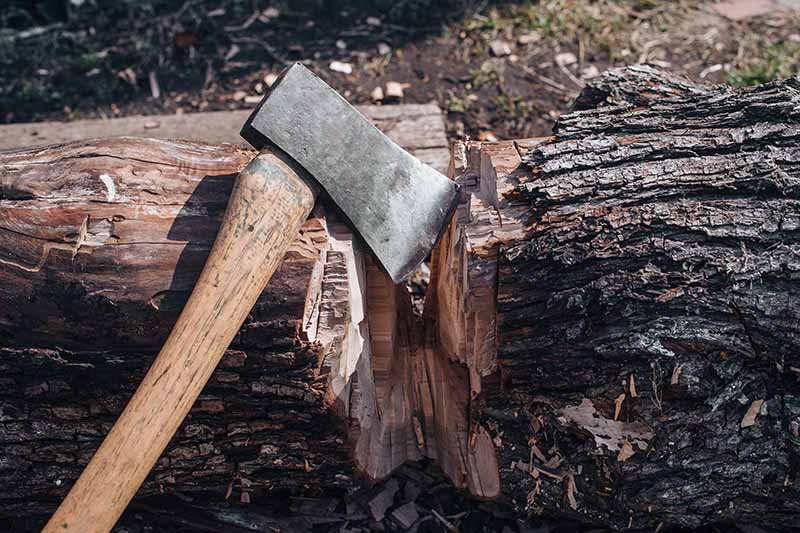

There are full-sized felling ones for cutting down mature trees, and smaller, lighter ones for cutting brush and saplings, like hatchets.
Broad axes are used for hewing and flattening round timber into flat-edged lumber, while a carpenter’s axe is designed for intricate woodworking.
Metal axes came to North America with the early settlers and many region-specific hybrids have been created since, with specialized features to meet specific geographic needs. The Kentucky, Hudson Bay, and Puget Sound models are just a few examples.
Designed to cut against the wood grain, they have a narrow striking head with a thin, sharply honed cutting edge.
An axe cutting face typically measures anywhere from three and a half to five inches and comes with a single or a double-sided bit (aka the blade).
The bit is forged on a light- to medium-weight head in the range of two and a half to three and a half pounds, and attached to handles of varying lengths, typically measuring from 28 to 36 inches.
Carefully tempered and sharpened, their primary function is to cut deeply across the grain. But they need to be deft enough to maneuver easily for more delicate tasks like trimming and woodworking.
Lighter and smaller than a maul, splitting axes typically have a narrow head embellished with built-up cheeks to form a wedge. And they lack a wide, round poll for striking wedges.
Mauls
Mauls have the same basic design elements as axes, with the most notable difference being in the wide, heavy head. And they serve only one function – splitting wood.
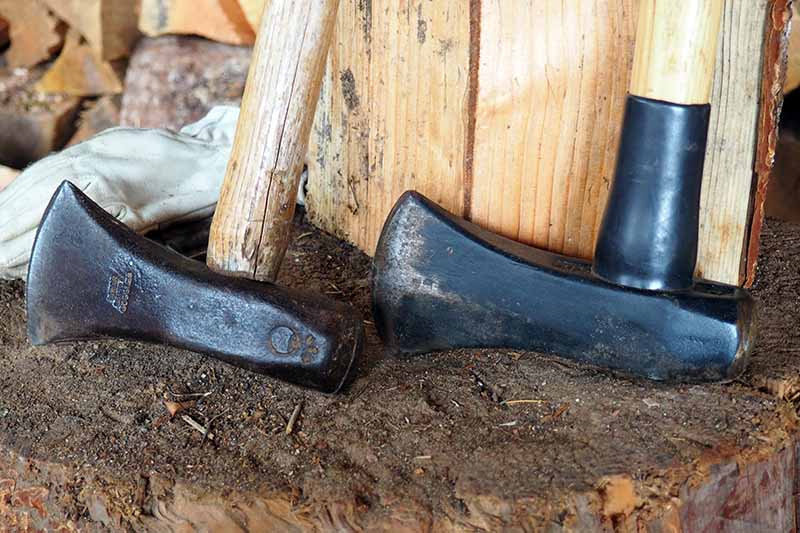

The cutting edge is slightly rounded, making it duller than an axe, and the head shape is much broader. A maul cleaves wood along the grain and is powered by the momentum generated by its heavy head – typically in the range of four to 12 pounds.
The head is often shaped with a slight convex curve or “cheeks” to accentuate the wedge, which is what allows it to forcefully drive the length of firewood without becoming stuck. The wedge forces energy out as well as downward, pushing the two sides apart as it travels.
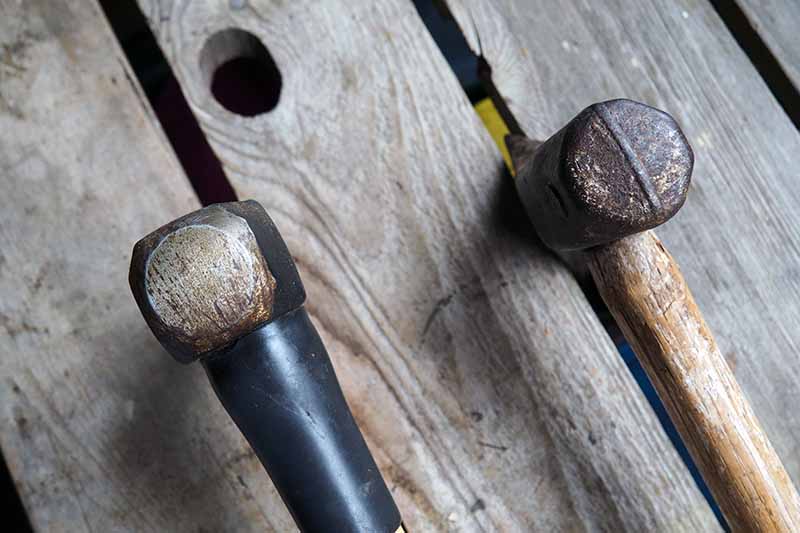

They also have a large, flat butt-end or poll, much like a sledgehammer. The poll end can be used to pound a wedge, and it can also act as a wedge and be struck with a sledgehammer to cleave long wooden rails or large rounds.
The eye of maul heads (the hole that the handle fits into) will be either a sledge-head eye or an axe-head eye.
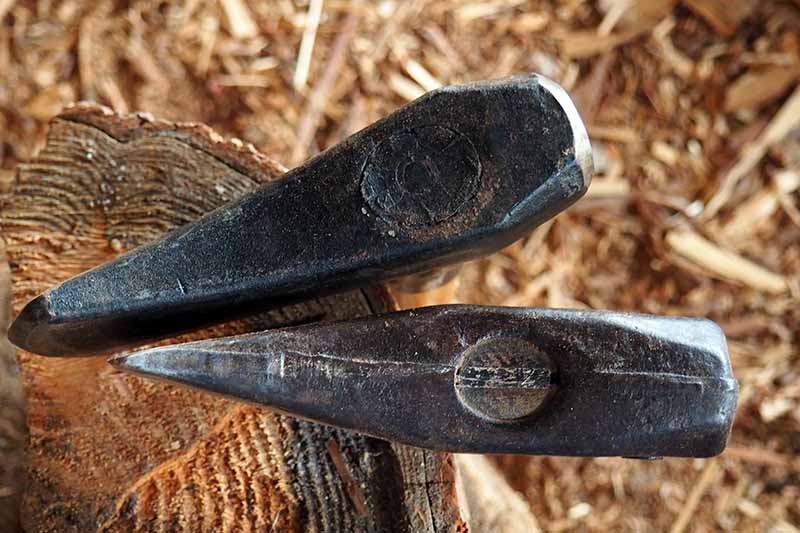

A sledge-head eye is round or slightly ovate to match the handle shape of sledgehammers, while an axe-head eye will be rectangular, oval, or teardrop shaped – similar to the shape of most axe handles at the shoulder.
Features and Accessories
Along with the head shape, size, and weight, consider the following features and accessories.
Handles
Handles are available in two basic options – wooden, and synthetic composites of hard plastic or rubber reinforced with fiberglass. Both are popular, and selection is a matter of personal preference.
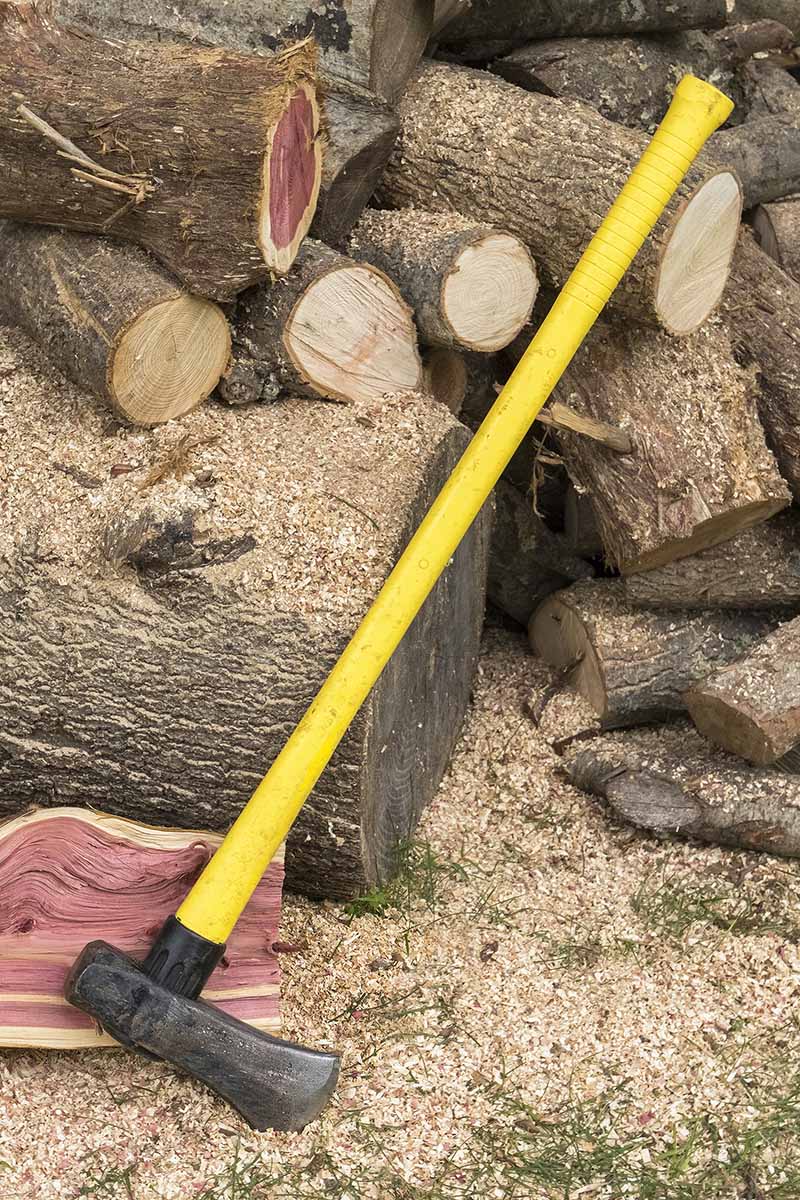

Choosing the handle length depends on your own height as well as the weight of the head. The longer the handle and the heavier the head, the more energy is delivered for cutting.
In general, maul handles are longer than that of an axe and range between 28 and 36 inches.
Here’s a good general rule of thumb to know your ideal handle length: the length of your inseam (the length measurement of your jeans) corresponds to a suitable length for the handle.
It’s always safe to go an inch or two longer, because it’s easy to choke up a little without losing accuracy.
On the other hand, if the handle is too short, your stance is compromised and you’ll need to squat to strike the wood cleanly – which is hard on the lower back, can throw you off balance, and may even expose your feet and shins to danger.
Wood Handles
Wooden handles need to be constructed of premium-grade hardwoods with a tough, fibrous grain that resists cracking. But they also need some flex to absorb the shock of striking hard materials.
Fire-hardened hickory is the most popular choice for its strength and resiliency, which makes it ideal for maul handles. Other common woods include ash, beech, yellow birch, sugar maple, and other hardwoods.
Wooden handles are often straight and true to the grain or lightly contoured for extra shoulder strength and ergonomic comfort.
Fiberglass/Synthetic Handles
Synthetics handles are also a popular choice for tool handles.
They’re advertised as being more difficult to break, with a longer life than wood. And they’re lighter in weight and absorb shock and vibrations better than wood.
Plus, those with a fiberglass core and a polypropylene or vulcanized rubber exterior tend to be more comfortable for long sessions, and offer better cold protection as well.
Protective Sheath
Most mauls have dullish bits and really don’t require protection to retain a sharp cutting edge.
However, splitting axes are sharp and benefit from a sheath to protect the bit when it’s not in use.
Shoulder Guards
Some mauls have an integrated metal or hard plastic sleeve that covers the shoulder, extending down from the head for several inches.
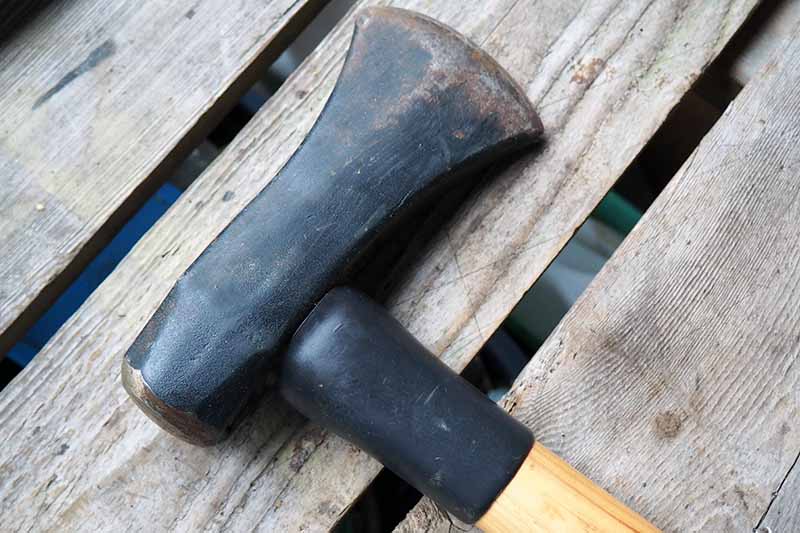

These protective spaulders add little to the overall weight but are excellent for preventing damage to the handle in the overstrike area.
Splitting Wedges
Splitting wedges are designed to make it easier to reduce logs or rounds into halves or quarters.
The wedge is driven into the round’s surface with a sledgehammer or pole, driving it deeper and increasing the cleaving energy with each strike.
A wedge cuts wood cleanly, making a single, deep rend that forces fibers apart. Each strike impacts the exact same area, opening and expanding the cut – compared to several strikes in roughly the same area with an axe or maul.
Wedges are made of aluminum or steel, and each material has its own pros and cons.
Aluminum performs better in cold temperatures than steel, which can actually crack if struck in frozen wood. But it’s softer and lighter than steel, which makes it less effective, with a shorter life.
This Garrett Wade wedge is forged of aircraft-grade aluminum with a twisted and grooved face to prevent it from popping out. Find prices and customer ratings at Garrett Wade.
The GroundWorx wedge is made of heavy-duty steel that’s ideal for starting a cut. Customer reviews and prices can be found at Tractor Supply.
It should also be noted that wedges constructed of ABS plastic are most likely designed for use as felling wedges – check product details closely, because they don’t work well for splitting.
A Chopping Block
Besides a maul, the other piece of equipment you’ll need is a suitable chopping block.
Wood can be split on the ground, but this is awkward and the soft ground weakens the effect of your swing – unless it’s frozen.
It also places unnecessary strain on the lower back and increases the risk of accidentally striking your lower extremities.
A base measuring around 12 to 24 inches in height provides a solid foundation for heavy strikes, and allows a full swing for the most forceful impact.
The best chopping blocks are flush-cut log segments, preferably a hardwood, with a diameter about twice the size of the largest pieces to be split.
The Swing of Things
Big and hefty or small and light, there’s a perfect maul or splitting axe for all of your firewood prepping tasks.
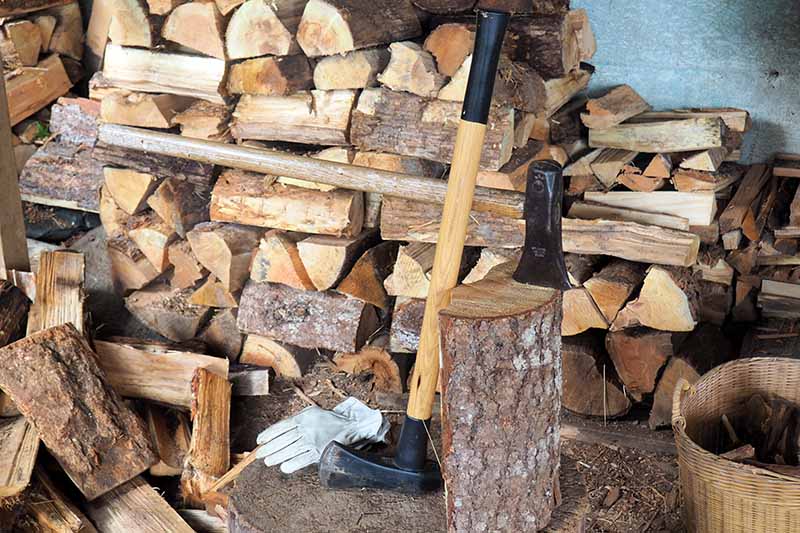

Choose the head shape and weight best suited for your needs and opt for a natural wood or synthetic handle that allows a full range of motion.
Then set up your chopping block and swing into a firewood-splitting session!
What do you folks prefer, a maul or the splitting axe? Let us know what you like – and why – in the comments section below.
And if you prefer well-built tools for the yard and garden, check out these gear guides next:

